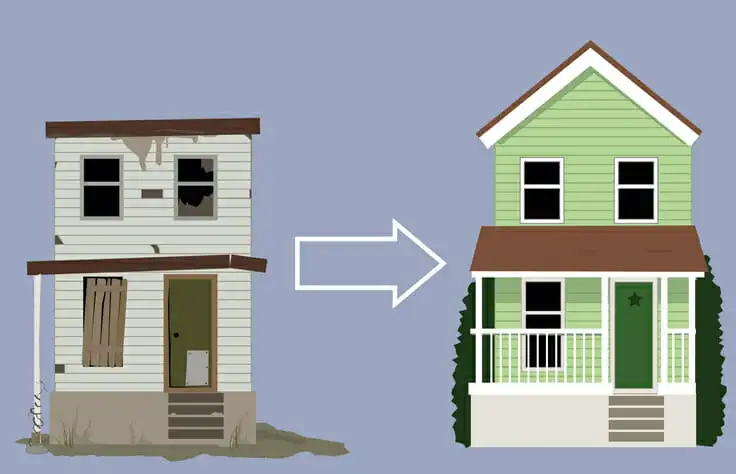Flipping houses can be a profitable venture, but it’s important to separate reality from the glamorized portrayals on TV. Success in house flipping requires experience, sufficient funding and a solid understanding of the process, especially when it comes to navigating taxes. Let’s take a closer look at what you need to know about taxation when you flip houses for sale.
For personalized guidance, a financial advisor can help you develop a comprehensive financial strategy for your real estate investments.
Are You a Real Estate Investor or Dealer?
The first question you need to answer when discussing house flipping and taxes whether you’re a real estate investor or dealer. The IRS treats each one differently for tax purposes.
- Investors buy and hold property, typically for a minimum of one year. They may use the property to generate rental income, with the expectation that it will appreciate in value. Investors pay capital gains tax if and when they sell the property at a profit.
- Dealers, on the other hand, are your traditional house flippers. Their whole reason behind buying the property is for resale. Dealers pay ordinary income tax on any profits realized from flipping houses.
Here are some points that the IRS will look for to determine if you’re a dealer:
- The frequency and amount of real estate purchases and sales
- Whether the property was ever listed as your primary residence
- Why the property was held and whether it served purposes other than for resale
- How much advertising and promotion went into property sales
- How many improvements were made
- The general activities of the taxpayer selling the property
In general, if you’re flipping a house, you’re buying it with the sole purpose of improving it and reselling it. This makes you a real estate dealer. If you have any further questions, you could contact a financial advisor or tax expert.
Flipping Houses and Capital Gains Tax
When you sell an asset for more than its basis or cost, you realize a capital gain. Capital gains are taxable; the rate you pay is determined by how long you held the asset before selling.
Short-term capital gains taxes apply when you sell assets after holding them for less than a year. The short-term capital gains tax rate is the same as your ordinary income tax rate.
2026 Short-Term Capital Gains Tax Rates
| Rate | Single | Married, Filing Jointly | Married, Filing Separately | Head of Household |
|---|---|---|---|---|
| 10% | $0 – $12,400 | $0 – $24,800 | $0 – $12,400 | $0 – $17,700 |
| 12% | $12,400 – $50,400 | $24,800 – $100,800 | $12,400 – $50,400 | $17,700 – $67,450 |
| 22% | $50,400 – $105,700 | $100,800 – $211,400 | $50,400 – $105,700 | $67,450 – $105,700 |
| 24% | $105,700 – $201,775 | $211,400 – $403,550 | $105,700 – $201,775 | $105,700 – $201,750 |
| 32% | $201,775 – $256,225 | $403,550 – $512,450 | $201,775 – $256,225 | $201,750 – $256,200 |
| 35% | $256,225 – $640,600 | $512,450 – $768,700 | $256,225 – $384,350 | $256,200 – $640,600 |
| 37% | $609,351+ | $768,700+ | $384,350+ | $640,600+ |
Long-term capital gains taxes are for assets held more than one year and are charged at a more favorable rate. Long-term capital gains tax rates range 0% to 20% depending on your tax bracket.
2026 Long-Term Capital Gains Tax Rates
| Tax Rate | Individuals | Married Filing Jointly | Head of Household | Married Filing Separately |
|---|---|---|---|---|
| 0% | $0 – $49,450 | $0 – $98,900 | $0 – $66,200 | $0 – $49,450 |
| 15% | $49,450 – $545,500 | $98,900 – $613,700 | $66,200 – $579,600 | $49,450 – $306,850 |
| 20% | $545,500+ | $613,700+ | $579,600+ | $306,850+ |
House flippers who are classified as dealers by the IRS are mostly going to pay the short-term capital gains tax rate. After all, the goal of flipping houses for sale is to get in, fix it up and sell it for a profit as quickly as possible. For each day you hold the property, you’re losing money.
Full Tax Treatment for Real Estate Dealers
Short-term capital gains tax is just one consideration if you’re a house flipper. Along with paying ordinary income tax rates on profits from the sale, which can go as high as 37%, real estate dealers will need to pay an additional 15.3% self-employment tax. You’re generally considered to be self-employed if you:
- Carry on a trade or business as a sole proprietor or independent contractor
- Are a member of a partnership that carries on a trade or business
- Are otherwise in business for yourself
House flipping falls into the self-employed category if you treat it as a business, not a hobby, and it’s your primary source of income.
Let’s work through an example using SmartAsset’s tax calculator. If a real estate dealer who files a joint return receives $200,000 in income for the year, they can expect to pay $36,734 in federal income taxes in 2026 (assuming the take the standard deduction of $16,100). Add to that $30,600 for self-employment tax and you’ve got a total tax bill of $67,334, or 33.67% of $200,000.
Of course, this is without accounting for additional tax deductions or credits. Deductions reduce your taxable income, while credits shrink your tax liability on a dollar-for-dollar basis.
Lowering Your House Flipping Tax Burden

Even with the high taxes of being a real estate dealer, there are several ways to lower your house flipping tax burden. Here are three steps to take to help lower your tax bill if you flip houses for sale.
1. Form an LLC
Before you get into house flipping, it’s smart to set up your business. One of the most popular business structures is a limited liability company, or LLC. LLCs allow you to take deductions for business expenses and as a pass-through entity, profits and losses flow to your personal tax return. Forming an LLC won’t necessarily reduce what you owe in taxes as a house flipper, but it can shield against double taxation.
Aside from that, an LLC can help you protect your personal assets against a legal claim if things go awry. An LLC can be a single-member entity or partnership, or be organized as a corporation to take advantage of applicable tax benefits. Keep in mind that LLCs are state-governed entities, so the exact rules on forming them and the benefits they provide vary by state.
2. Make Tax Deductions
If you have business expenses as a house flipper, you may be able to write them off on your taxes. Here are nine common deductions you may be able to make:
- Home improvement costs on sold properties
- Interest on real estate loans
- Property taxes on investment properties
- Building permit costs
- Real estate commissions
- Travel expenses
- Office supplies
- All off-site office expenses, like rent, internet, utilities, etc.
- Legal and accounting fees
Keep a paper trail for any expenses you plan to deduct. While IRS audits are relatively rare, there’s never a 0% chance that you won’t be targeted for one. Accurate documentation could help you come through an audit relatively unscathed.
3. Deduct Capital Losses
A capital loss occurs when you sell an asset for less than what you paid for it. It’s entirely possible that you may end up losing money on a flip if you can’t sell it at a price point that allows you to recoup everything you put into it.
The upshot is that you can deduct any capital losses you face and use them to offset your capital gains tax. This occurs through a process called tax-loss harvesting. Harvesting losses from the sale of a home is only allowed when the property is used for business purposes. You can always talk with a financial advisor about how best to offset these gains with losses, and whether you qualify for capital loss carryover.
Tax Breaks You Won’t Get as a House Flipper
Despite what you may read on the internet, if you’re an active house flipper, and are flipping multiple houses a year, there are tax breaks others get that you won’t. Here are a couple of the tax breaks you may want to consider:
- 121 exclusion: This IRS rule applies to your primary residence. It lets you avoid capital gains tax on the profit of the sale of your primary residence, up to $250,000 in profit (or $500,000 if married). To reiterate, this house must be listed as your primary residence to qualify. The exclusion requires you to have lived in the home for at least 24 of the previous 60 months. That means houses for quick flipping usually won’t qualify.
- 1031 exchange: This tax deferment program allows investors to sell one investment property and defer the taxes on the sale by buying a new investment property. The IRS gives you 45 days to identify a replacement property and 180 days to make the transaction. But why can’t house flippers take advantage of this? The IRS generally prohibits 1031 tax benefits from extending to properties held primarily for resale.
State and Local Taxes on House Flipping
Federal tax rules get most of the attention, but state and local taxes can hit house flippers just as hard. If you flip in a high-tax state such as California, New Jersey or New York, state income taxes will cut directly into your profits. These rates can run into double digits, meaning a significant portion of your profit is gone before you even account for federal tax.
On top of state income tax, flippers may be responsible for paying:
- Transfer taxes or recording fees each time the property changes hands
- Annual property taxes
- Maintenance costs, insurance, utilities and loan interest
- Local licensing or permit fees
Flippers working across state lines face an added layer of complexity. Each state sets its own tax rules, so you may have to file multiple state returns in a single year. Without planning, this can create both higher costs and more administrative work. Understanding the local tax landscape before you buy helps you set realistic expectations about your true profit.
Bottom Line

Buying and selling real estate can be a complex process, especially once you include house flipping taxes. It’s best to go into the business prepared, knowing what you’ll be on the hook for. You need to know what the IRS will require you to pay, along with how to structure your business so that you put yourself in the best position to succeed for the long haul.
Tips for Flipping Houses
- Your house-flipping business doesn’t have to try to manage its finances from growth capital to tax planning on its own. Having a financial advisor in your corner can take a huge weight off your shoulders and provide you with more opportunities to grow. Finding a financial advisor doesn’t have to be hard. SmartAsset’s free tool matches you with vetted financial advisors who serve your area, and you can have a free introductory call with your advisor matches to decide which one you feel is right for you. If you’re ready to find an advisor who can help you achieve your financial goals, get started now.
- Along with getting your taxes in order, you should pay attention to where you bank. Some banks are just more friendly to small businesses. Check out our list of the best banks for small businesses to take advantage of these opportunities.
Photo credit: ©iStock/Feverpitched, ©iStock/Svetlana Malysheva, ©iStock/Aleutie
